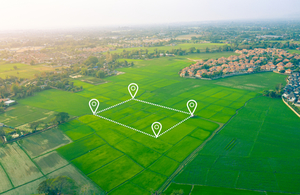Geospatial Commission launches pilots to improve how data about land is used in the UK
Three pilots in Devon, West Midlands and Northern Ireland will test how to identify and improve key data that helps inform decisions on whether land across the UK is used for housing, infrastructure or net zero.
Land is the UK’s most valuable asset, worth £5.4 trillion in 2017. This finite resource faces competing demands from housing, planning, infrastructure, farming, food production, carbon sequestration, flood protection, habitat creation, underground mineral and geothermal resources.
Demands on land will increase with the need to reach target reductions in net zero greenhouse gas emissions, build more affordable and sustainable homes, and deliver over £600 billion of infrastructure investment over the next five years to Build Back Better.
The Geospatial Commission is working with its pilot area partners in Devon, West Midlands and Northern Ireland, investing £4.56 million as part of a new National Land Data Programme. The pilots will deliver a blueprint for land use data improvement priorities, evidence about how to overcome the data access challenges, and test the benefits of a common UK-wide platform for land use data.
Lord True CBE, Minister of State at the Cabinet Office, said:
To make the right choices about how we use our land, we need to ensure that the relevant data are available. The National Land Data Programme pilots will provide insights into the current data access challenges to help improve data that supports effective decision-making and contributes towards critical government priorities, including working towards net zero and housing development.
Sir Bernard Silverman, GC Chair, said:
Having recently been appointed chair of the Geospatial Commission, I am excited to see the launch of the National Land Data Programme pilots. They will be critical in delivering improved access to better location data, one of the key commitments made in the UK Geospatial Strategy.
For more information about the year ahead, read the Geospatial Commission Annual Plan 2021/22.

